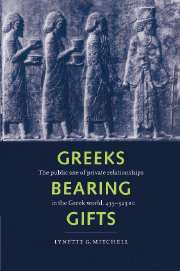Book contents
- Frontmatter
- Contents
- Preface
- Abbreviations
- 1 Philia
- 2 Philia and the polis
- 3 Philia and political activity
- 4 Magisterial appointments: Sparta
- 5 Magisterial appointments: Athens
- 6 Persia and the Greeks
- 7 Athenians and Thracians
- 8 Philip and the Greeks
- 9 Alexander
- 10 Friendship and ideology
- Appendix I Magistrates with connections
- Appendix II Notes on magistrates for the years 435–323 BC
- Bibliography
- Indexes
7 - Athenians and Thracians
Published online by Cambridge University Press: 06 July 2010
- Frontmatter
- Contents
- Preface
- Abbreviations
- 1 Philia
- 2 Philia and the polis
- 3 Philia and political activity
- 4 Magisterial appointments: Sparta
- 5 Magisterial appointments: Athens
- 6 Persia and the Greeks
- 7 Athenians and Thracians
- 8 Philip and the Greeks
- 9 Alexander
- 10 Friendship and ideology
- Appendix I Magistrates with connections
- Appendix II Notes on magistrates for the years 435–323 BC
- Bibliography
- Indexes
Summary
A man's gift maketh room for him, and bringeth him before great men.
Proverbs 18.16During the fifth and fourth centuries, the Athenians were greatly concerned with events in the Thraceward region and the Thracian Chersonese. This led them to follow a policy of trying to form close links with members of the Thracian royal households through gifts of citizenship. However, the awarding of such honours did not always produce the desired results, and even placed the Athenians in the embarrassing situation of being openly at war with their own honorands. On the whole, the manner in which the Athenians dealt with the Thracian kings was clumsy and highlighted their own weaknesses and insecurities, and it particularly points to their lack of sensitivity to a culture not like their own.
The Thracians and gift-receiving
Like the Persians', the Thracians' was a gift-giving culture. Just as there was an up-and-down flow of gifts from King to subjects and subjects to King in the Persian kingdom, so it was among the Thracians. But despite general similarities between the two cultures, gift-giving as an institution among the Thracians differed in significant ways from gift-giving in Persia, and this affected the way in which relationships flowed from the exchange and expectations were created by the exchange. In a digression describing the extent of the territory and customs of the Thracians, Thucydides says:
The tribute from all the barbarian territory and the Greek cities as was paid in the reign of Seuthes, who was king after Sitalces and brought it to its peak, was valued at about four hundred talents of silver, paid in gold and silver.
- Type
- Chapter
- Information
- Greeks Bearing GiftsThe Public Use of Private Relationships in the Greek World, 435–323 BC, pp. 134 - 147Publisher: Cambridge University PressPrint publication year: 1998



